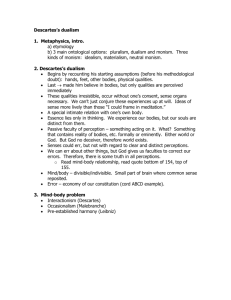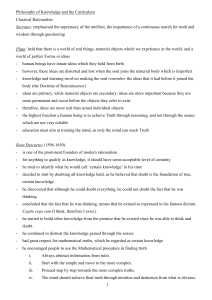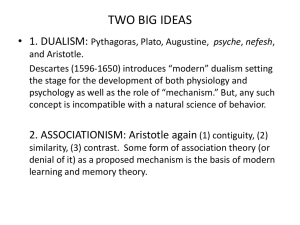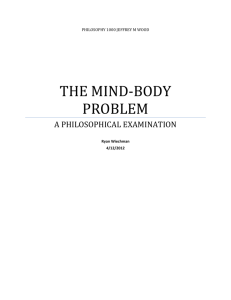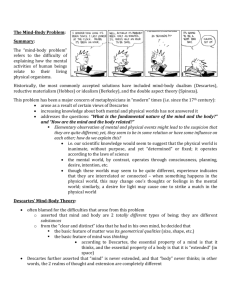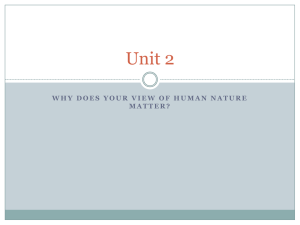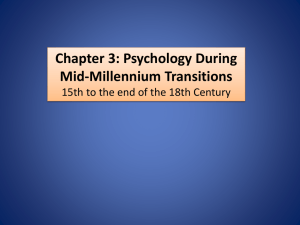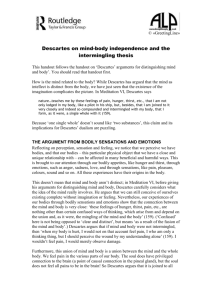Wright, John P. and Potter, Paul (eds.), Psyche and Soma
advertisement
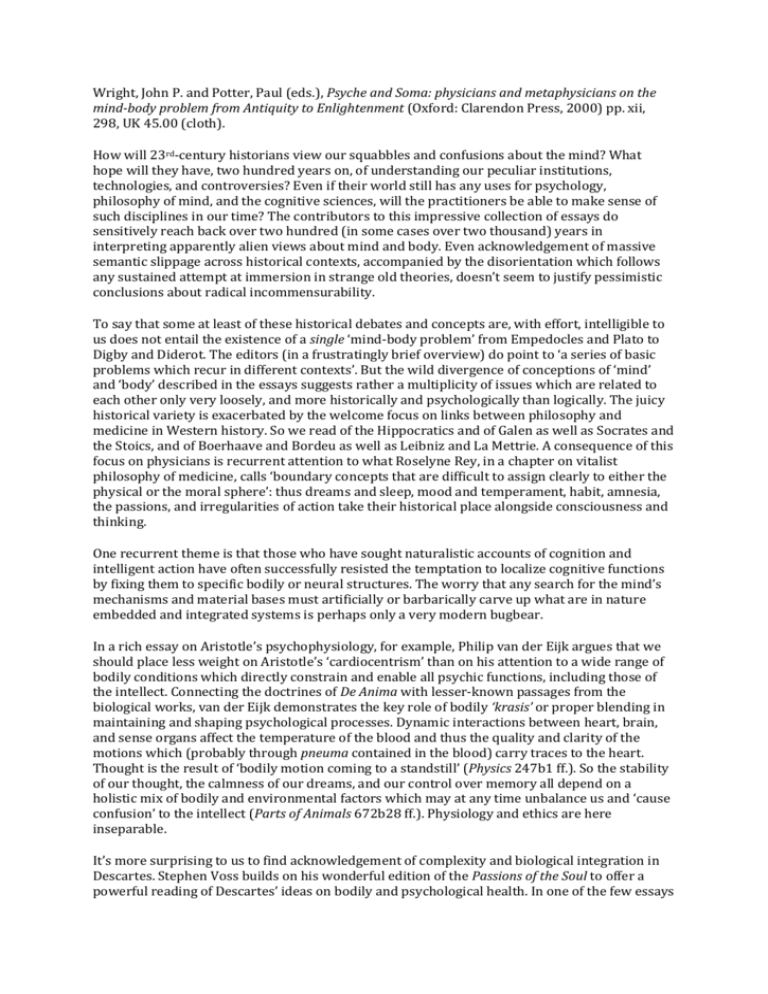
Wright, John P. and Potter, Paul (eds.), Psyche and Soma: physicians and metaphysicians on the mind-body problem from Antiquity to Enlightenment (Oxford: Clarendon Press, 2000) pp. xii, 298, UK 45.00 (cloth). How will 23rd-century historians view our squabbles and confusions about the mind? What hope will they have, two hundred years on, of understanding our peculiar institutions, technologies, and controversies? Even if their world still has any uses for psychology, philosophy of mind, and the cognitive sciences, will the practitioners be able to make sense of such disciplines in our time? The contributors to this impressive collection of essays do sensitively reach back over two hundred (in some cases over two thousand) years in interpreting apparently alien views about mind and body. Even acknowledgement of massive semantic slippage across historical contexts, accompanied by the disorientation which follows any sustained attempt at immersion in strange old theories, doesn’t seem to justify pessimistic conclusions about radical incommensurability. To say that some at least of these historical debates and concepts are, with effort, intelligible to us does not entail the existence of a single ‘mind-body problem’ from Empedocles and Plato to Digby and Diderot. The editors (in a frustratingly brief overview) do point to ‘a series of basic problems which recur in different contexts’. But the wild divergence of conceptions of ‘mind’ and ‘body’ described in the essays suggests rather a multiplicity of issues which are related to each other only very loosely, and more historically and psychologically than logically. The juicy historical variety is exacerbated by the welcome focus on links between philosophy and medicine in Western history. So we read of the Hippocratics and of Galen as well as Socrates and the Stoics, and of Boerhaave and Bordeu as well as Leibniz and La Mettrie. A consequence of this focus on physicians is recurrent attention to what Roselyne Rey, in a chapter on vitalist philosophy of medicine, calls ‘boundary concepts that are difficult to assign clearly to either the physical or the moral sphere’: thus dreams and sleep, mood and temperament, habit, amnesia, the passions, and irregularities of action take their historical place alongside consciousness and thinking. One recurrent theme is that those who have sought naturalistic accounts of cognition and intelligent action have often successfully resisted the temptation to localize cognitive functions by fixing them to specific bodily or neural structures. The worry that any search for the mind’s mechanisms and material bases must artificially or barbarically carve up what are in nature embedded and integrated systems is perhaps only a very modern bugbear. In a rich essay on Aristotle’s psychophysiology, for example, Philip van der Eijk argues that we should place less weight on Aristotle’s ‘cardiocentrism’ than on his attention to a wide range of bodily conditions which directly constrain and enable all psychic functions, including those of the intellect. Connecting the doctrines of De Anima with lesser-known passages from the biological works, van der Eijk demonstrates the key role of bodily ‘krasis’ or proper blending in maintaining and shaping psychological processes. Dynamic interactions between heart, brain, and sense organs affect the temperature of the blood and thus the quality and clarity of the motions which (probably through pneuma contained in the blood) carry traces to the heart. Thought is the result of ‘bodily motion coming to a standstill’ (Physics 247b1 ff.). So the stability of our thought, the calmness of our dreams, and our control over memory all depend on a holistic mix of bodily and environmental factors which may at any time unbalance us and ‘cause confusion’ to the intellect (Parts of Animals 672b28 ff.). Physiology and ethics are here inseparable. It’s more surprising to us to find acknowledgement of complexity and biological integration in Descartes. Stephen Voss builds on his wonderful edition of the Passions of the Soul to offer a powerful reading of Descartes’ ideas on bodily and psychological health. In one of the few essays which addresses medicine and philosophy together, Voss argues that Descartes’ mechanistic reinterpretation of natural philosophy and physiology allows ‘immensely varied powers and tendencies’ to organized matter like that of human bodies. There is no dualism between life and matter as between consciousness and matter: although arguing that they are machines, Descartes is clear that he does not ‘deny life to animals’. This is an important corrective to the prevailing assumption that Descartes simply banishes life and organization from the physical world. The optimistic Cartesian reduction of the old sensitive and vegetative souls (responsible for memory, sensation, dreams, and movement as well as growth, digestion, and reproduction) is precisely not anelimination of these functions. And while there is no science of the soul, engaged experience with the idiosyncratic operations of our imaginations and our bodies can support a range of moral and medical ‘lore’ on which our souls draw in seeking psychosomatic and naturopathic remedies for the woes we suffer as composite creatures. A number of papers contribute to the puzzling history of dualism. Rylean or phenomenological mockery of ghostly souls magically acting behind dead mechanical flesh just doesn’t deliver us up any easy understanding of self, body, and action. We still all know about inner dislocations and conflicts, both psychological and psychophysical, which require philosophical and practical attention. Among the difficult issues which remain, on which both cognitive anthropology and mainstream cognitive science itself have serious explanatory work to do, is in understanding why so many people have believed dualism. If we are subject to a ‘user-illusion’, as Dennett calls it, what combination of facts about language, cognitive architecture, history, and social cohesion might explain this illusion itself? In a short paper on Augustine’s dualism, Gareth Matthews is more preoccupied with finding phrases and methods which are ‘likely to remind modern readers’ of Descartes, of Heidegger, or of Norman Malcolm. But between nuanced essays on Plato’s shifting views (by T.M. Robinson) and on varieties of dualism in 18th-century medicine (by John Wright), we get a fascinating account by Theo Heckel of St Paul’s influential but bewildering responses to the Corinthians. Heckel interprets Paul’s awkward notion of the ‘spiritual body’ we’ll receive at the Last Judgement as ‘a collective concept’, relating to the community of believers. Heckel realizes that this ‘collective assumption’ is so ‘jarring’ that few theologians have noticed it, but he doesn’t fully acknowledge its profound tension with the individualism at the heart of most Christian eschatology. It’s precisely because eternal reward and punishment must be meted out to me that personal memory is required in the afterlife, which is one motive for holding on to the idea of bodilyresurrection in the first place. Averroes’ tempting ‘monopsychistic’ interpretation of Aristotle, by which my organic soul is mortal, but partakes of a single eternal and collective human intellect, was dangerous enough, as Emily Michael’s elegant survey of Renaissance theories of soul shows, to motivate massive theological resistance in the 15th and 16th centuries. The remaining essays are a general account of soma and psyche in Hippocratic medicine (Beate Gundert); a brilliant and detailed survey of Hellenistic medical and philosophical views of body, soul, and nerves (Heinrich von Staden); a discussion of Pierre Bayle’s responses to Leibniz, Locke, and 17th-century materialism (Thomas Lennon); a description of the early 18th-century dispute between Stahl and Leibniz on the nature of organic life (Francois Duchesneau); and an intriguing diagnosis of the sudden emergence of a new dualism of physique and moral in late 18th-century France (Francois Azouvi). So the collection’s historical coverage is thorough, with perhaps only 17th-century theories left seriously under-examined: in other times, the relegation of both Hobbes and Spinoza to a couple of passing references in a volume on this topic would have been somewhat suspicious. A number of contributors draw connections with the changing historical accounts of personal identity and self-control which have concerned physicians as much as philosophers. Indeed the rich contextual detail about different mind-body problems offered by these essays drives the suspicion that the threat of materialism itself has often been less important than the fear that increased attention to the dynamic neural and bodily bases of cognition might undermine the quest for moral self-mastery. How can I hope to banish undesirable thoughts or memories, to focus on the good or the true (or even on reality), and to keep my personal past in order, if my thoughts are produced and constrained by fleeting nervous fluids, animal spirits, or other ‘secret inclinations’ and embodied habits which are inaccessible to my consciousness and to volitional control? These are issues which won’t disappear as animal spirits give way to neural prostheses and hydraulics to robotics. This volume helps us to understand old patterns of resistance to biological accounts of the mind, and to appreciate the richness of past alternatives. And such work is not virtuous but obscure historical cataloguing: rather it can be seen as the collation of integral data towards the development of better, culturally-sensitive cognitive sciences in the future.
